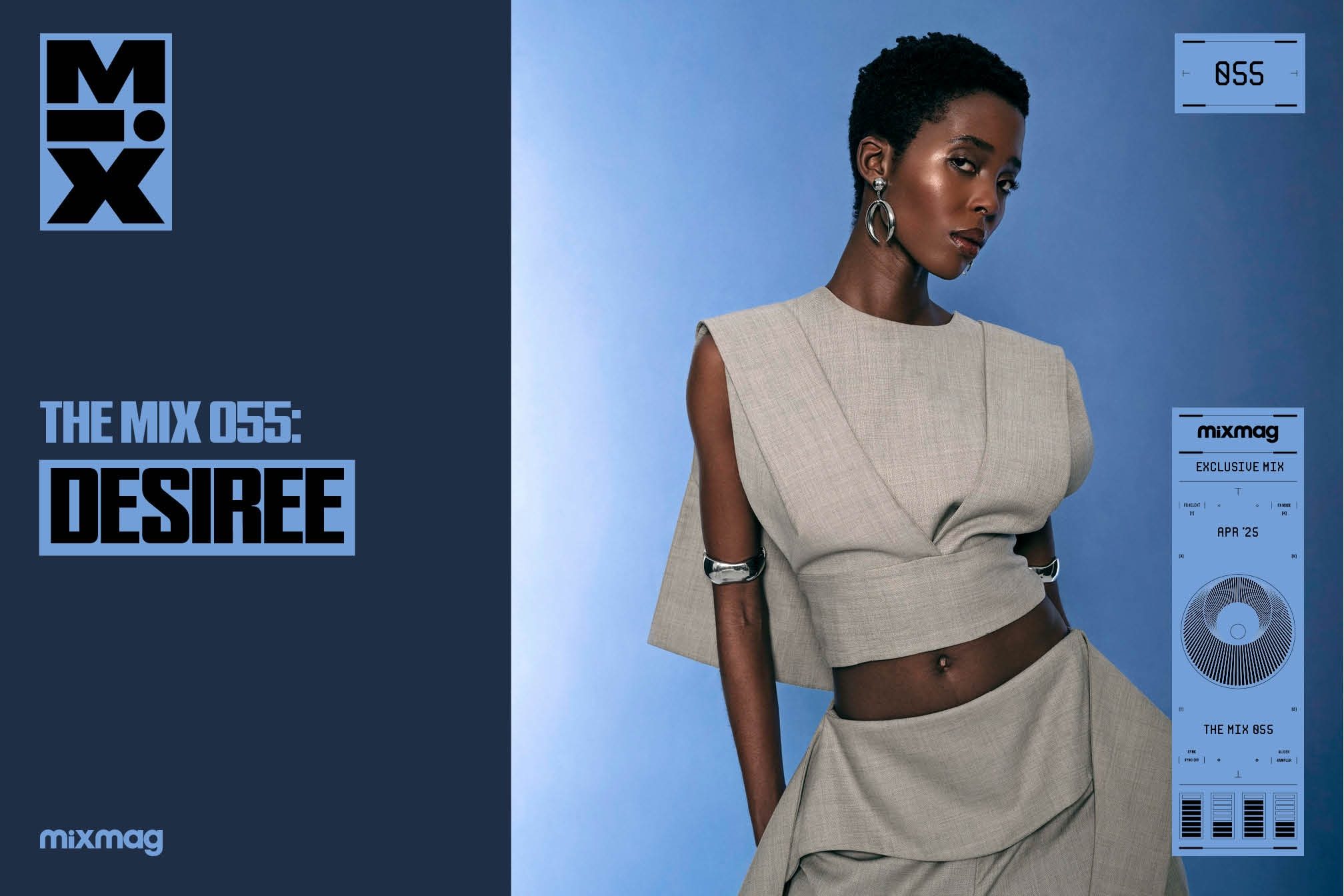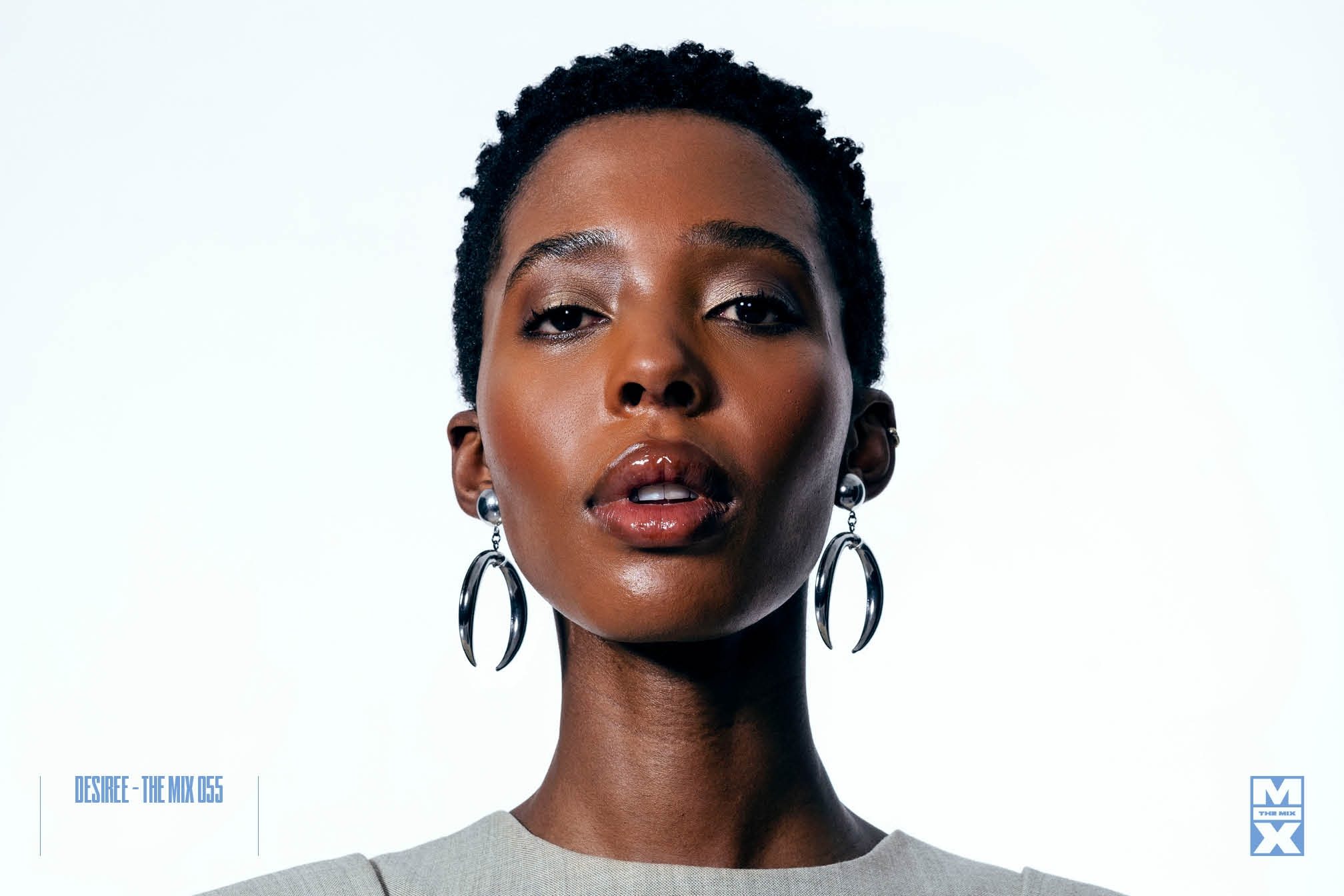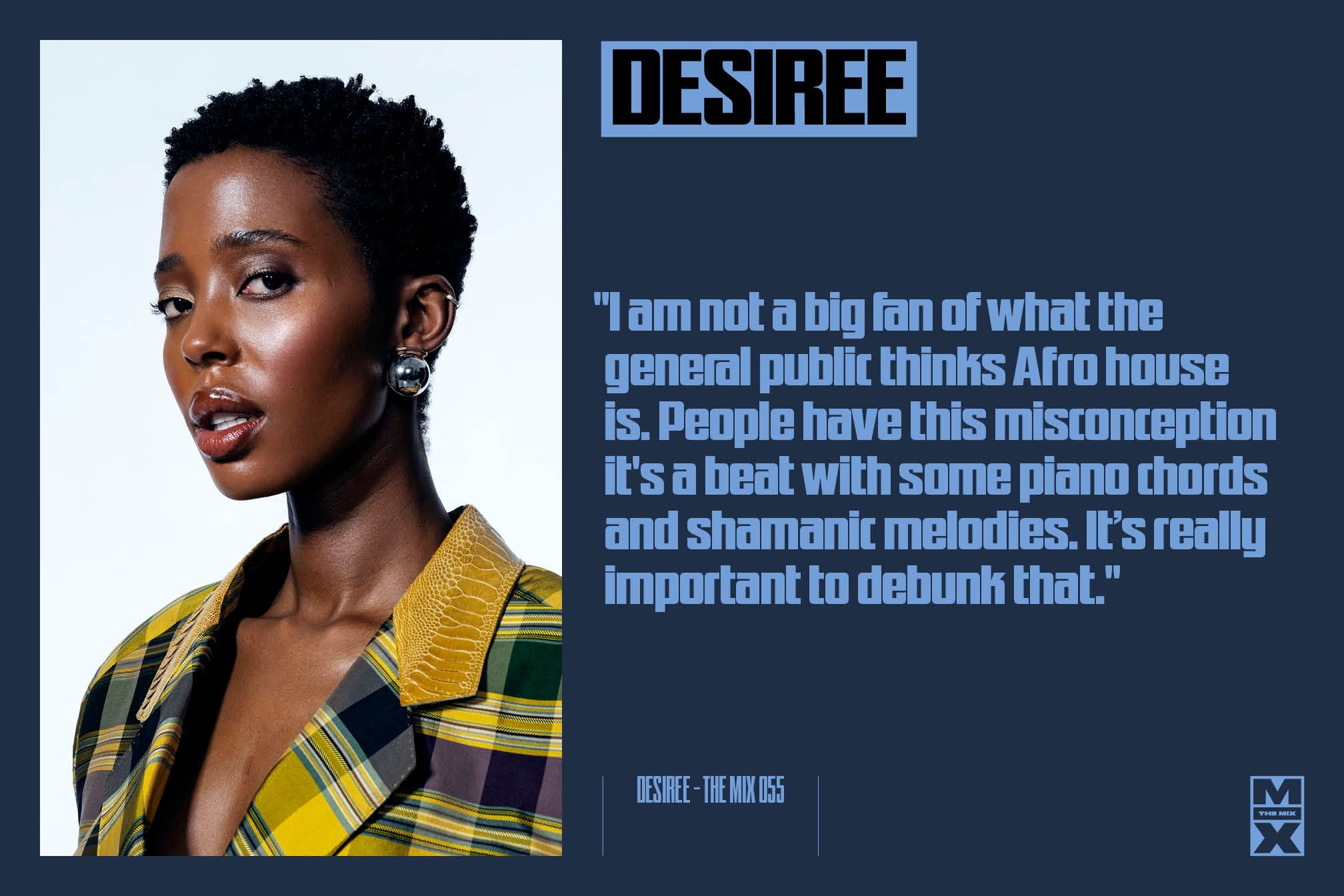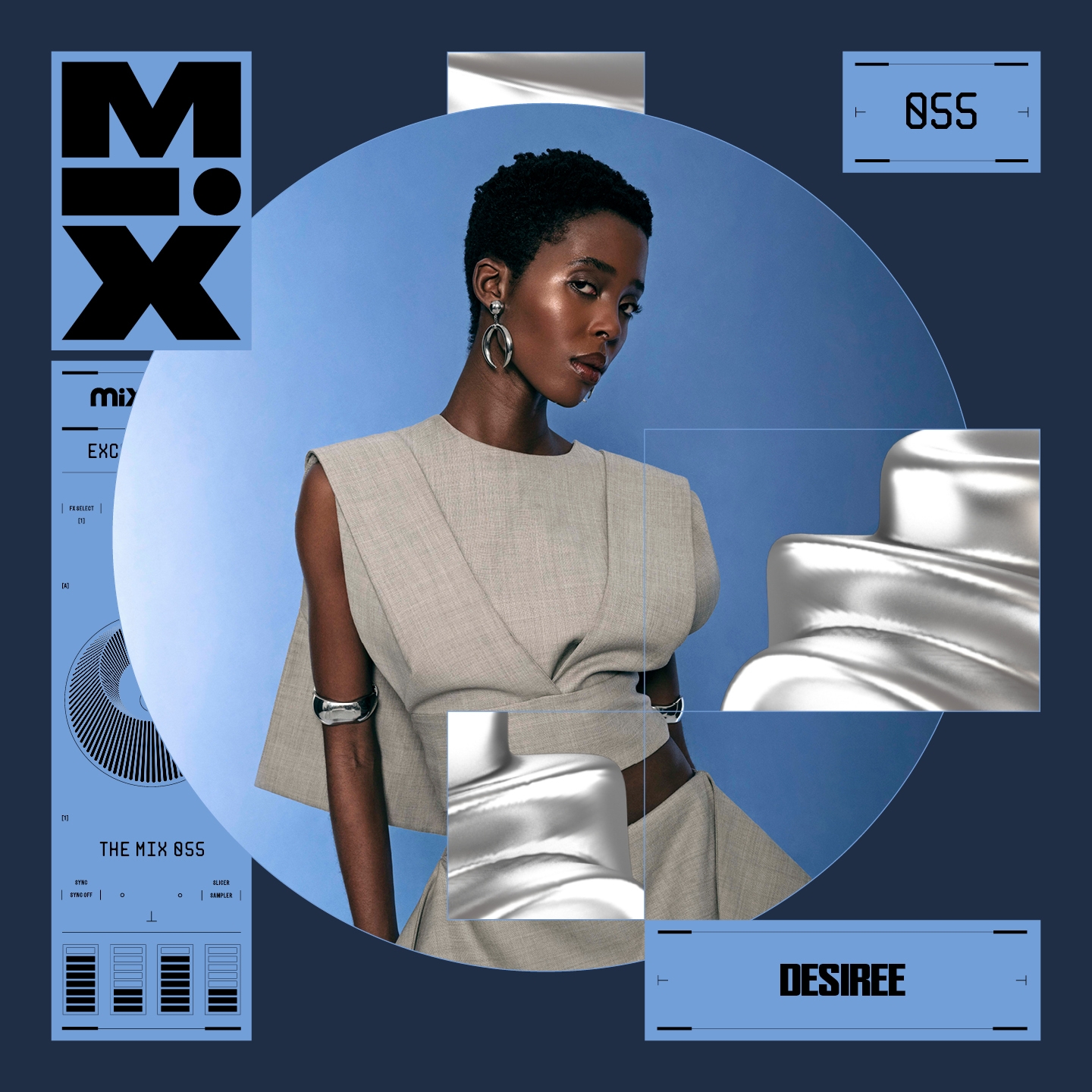 Music
Music
The Mix 055: DESIREE
Living half of the year in Johannesburg and the other half based in Berlin while touring the world, DESIREE is a DJ and producer who is diversifying dance music globally with her eclectic sound and advocacy for those who subvert ingrained societal expectations
To South African audiences, DESIREE is more than a sister returned from abroad with a bag of musical treats. And to audiences in Europe, the US, Latin America and elsewhere, she’s more than a straightforward Afro house DJ born and raised in South Africa. DESIREE’s refusal of simplicity, rejection of inaccuracy, and upholding of creative expression above everything else makes her a champion of dance music with a purpose.
Behind the decks at a Kunye event in Johannesburg in 2024, DESIREE is framed by a half circle cloud from smoke machines and backdropped by revellers dancing to her set on stage. The party is known for Afro house, AfroTech and 3-step, which together make up a dance music scene still considered alternative to the amapiano sound which is most prevalent in the South African capital. DESIREE is in her element surrounded by this relatively small but fanatical and deeply knowledgeable audience. Her face is focused, but her body moves smoothly to the rhythm that she is punching and blending in — she is both present on stage yet dancing with her audience. And that is DESIREE: a musician, a lover of dance music, but also a level head watching it all closely.
From before her name was capitalised, Desiree Shilabje has been a champion of Afro house music, but with a taste that spans across the house spectrum from its Chicago origins through its deeper and techier evolutions, among others. At the University of the Witwatersrand (Wits) in Johannesburg, which she graduated from in 2018, she dove into the city’s nightlife scene and immersed herself in dance music. “When I discovered this Afro house music, it just made sense for me,” she told me in a 2022 interview. “It was similar to techno, but it had African elements. It resonated with me as an African as well. It was the perfect genre for me. Whenever I would go out, that’s all I wanted to hear.” She attended and became a regular at the city's then-niche house music parties, including Surreal Electronica, by Jackie Queens and Swizz, and The Rhythm, run by Punk Mbedzi, who would later book DESIREE for one of her first DJing gigs where she shared the line-up with South African house music trailblazer Da Capo.
Read this next: How Black women and queer communities are shaping the future of African electronic music
But there was something amiss about the scene that had welcomed her. “It’s very male dominated,” she said, “not only on the decks, but also the makeup of the audience. I stood out when I was in the audience; if you don’t have women playing at your events, then in turn, you won’t have as many women on the dancefloor. The same as if you don’t have women A&Ring music at record labels or women pitching for playlists at the different streaming platforms, then you won’t have women producers who are being given opportunities. These things work hand in hand.” Jackie Queens would manage and mentor DESIREE for much of her early career, including releasing her debut EP, 'Femme Tech', on Bae Electronica, the label Jackie Queens founded in 2015 to boost the visibility of women in South African house. They have both been pivotal figures in turning this tide.
The commitment to advocating for and adding to the cause of diversifying all aspects of dance music production and consumption has been an important reason DESIREE has made the career moves that she has. In a 2021 Instagram post she revealed her diagnosis of androgen insensitivity syndrome at the age of 20 in 2016, and declared: “From this day onwards, I want to be intersex and not be ashamed about it. I would also like to raise awareness about it.” A year later, on the same platform, she wrote about what role music played for her as an intersex woman. “Subsequent to my diagnosis, music lamented its place in my life as an outlet and a source of support. My song 'Femme' is thus an ode to navigating this heteronormative world as an intersex woman. It’s a dedication to anyone that does not fit societal norms.”
From track titles alone, a significant portion of DESIREE’s releases have been acts of gender advocacy. 'Femme' was one of the two tracks on DESIREE’s 'Femme Tech' debut EP in 2022. Its bassline and vocal loop are nostalgic of late '90s, early 2000s era of South African house music. These two musical elements drive a track that is otherwise of its time, when AfroTech was gaining its foothold in the dance music capitals of Europe, US and pockets of Latin America. 'Pussy Power' (DESIREE remix) the following year was an uplifting, soulful twist to the Berlin-based Keinemusik collective’s hard hitting, '80s-inspired original. More recently, DESIREE released 'INTERSEXY', her second two-track EP which is a meeting place of driving percussion and soft, ethereal piano chords and vocals.
“I'm a DJ before I'm a producer,” DESIREE says. “For me, being a DJ means you're a lover of music. You enjoy listening to different sounds, putting them together in the mix and introducing them to people.” But as a music collector and curator, her musical interests go further than her platform as an artist. DESIREE runs MMiNO, an event and record label she uses to explore the various dance music styles from the African content and its global diaspora. “I'm enjoying all of these sounds, even though I do not necessarily play them.”
We caught up with DESIREE to talk about her shift from becoming a supporter of Afro house to one of its champions and diversifying dance music globally.

How do you divide your work and personal time, and your time in South Africa and elsewhere touring nowadays?
I would say it’s 50/50. I try to be in South Africa for half of the year even though it’s a bit of a challenge with all the touring. This is really something that I’m prioritising this year. I'm trying to do far less touring than I've been doing in the last two or three years so that I can have the space and the capacity to be more creative, go into studio and just explore all the weird and wonderful ideas that are in my brain.
You have a unique vantage point to be able to see music tastes in South Africa, across Europe, the US and elsewhere in real dancefloor time. How do current music tastes compare in the places that you tour globally?
Let me make an example. For me, 3-step falls under that umbrella of Afro house, I don’t particularly see it as a completely new genre. 3-step is beautiful, creative, new and fresh. I love it. But if you’re in some club in Germany, it’s just far too slow for those people. This is the challenge that I always have. I enjoy playing in these spaces where people are not necessarily very well versed in the sound. And I like to be the person that is there to convert them or introduce them to this new sound. The challenge is that of course they’re not used to this new sound and they are usually used to faster, harder music. How do you introduce that sound to them while maintaining that energy that they are used to? Afro house is maybe not as hard as people would like in that moment when it’s like 4:AM and we’re in a basement club somewhere. The music seems to be a bit on the softer end of the spectrum for people who are not African.
Read this next: Journey Music: South Africa's AfroTech sound travels globally and transports spiritually
How has curating your DJ sets changed as you’ve become more popular and your sets have become more important to the success of the events you play at?
One thing I can say that has remained consistent in my sets and how I curate them is that from the beginning, I never played 100% Afro house. I’ve never done that. My selection has always been very, very eclectic, it has always been very worldly. I’ve always been very curious and I’ve always been into other genres of house and electronic music, in addition to Afro house, that I grew up with in South Africa. The more I travel, the more I listen to other DJs that are spinning other genres and so forth, the more it kind of solidifies how I’ve always been curating my sets. I’m being inspired by all these different sounds that I’m hearing, and I’m incorporating them into my sets. But how do you stay true to yourself, to your roots, to what fuels you, whilst also making the crowd happy, hyping the crowd? The people are there to dance, they’re there to rave. And I think that’s how I’m able to then bring in my heritage, my roots into these spaces, while also giving them something that they’re a bit familiar with.
But there has also always been a definitive DESIREE sound. How would you describe your sound currently?
It’s always changing because I’m a DJ before I’m a producer. For me, being a DJ means you’re a lover of music. You enjoy listening to different sounds, putting them together in the mix and introducing them to people.
A lot has changed in dance music, especially Afro house, since your debut release in 2022. What do you think has made Afro house so popular now?
I would like to say that I am not a big fan of what the general public thinks Afro house is. At this juncture that we’re in globally with the genre being so popular, I’m resonating less and less with what people perceive Afro house to be. There’s a general misconception about what is Afro house and what is not. In a lot of the festivals and clubs that I play, people have this perception that Afro house is this beat with some piano chords and, like, some shamanic melodies in the background. It’s really important to debunk that. So for me at the moment, it’s very, very important to give people a reminder of the roots of the genre and how it sounds, at least traditionally, and how it sounded to me when I initially discovered it, how it sounds back home. I think for me right now, my sound is rooted in educating people on the different shades that Afro house exists in.

From your unique perspective, what do you think makes South Africa this significant of a contributor to the global dance scene?
I think that it largely has to do with our culture in South Africa. I think the way that we respond to the music, the way that we dance is completely different. I find that when I play at home, it’s always a bit jarring for me to observe the differences in the club culture in South Africa versus the club culture in Europe. I find that especially in the [South African] Afro house space people are generally a bit more chilled at parties. Not in a bad way like they are bored or anything. They dance, they’re responding to the music. But it’s in a much more laid-back fashion. We always say “The aim is not to sweat,” and you literally see it. I think that influences the type of music that we consume and ultimately the type of music that we produce. I feel the rhythms, the textures are more soulful, more warm and cosy. It’s very clear that we have produced and enjoyed our own version of dance music for a very long time and it’s deeply entrenched into our culture. The world is only just waking up now, but this is not a trend.
Tell us about how MMiNO came about and how it evolved into what it is currently?
MMiNO came out of frustration because especially in the South African context, I felt like there were not enough spaces for artists who were not necessarily playing like the norm, artists that were looking to explore sounds that you are not necessarily hearing in your average club or dance institution in South Africa. So I kind of wanted to create that space and build that community of like-minded individuals that are a bit more open minded and give DJs the freedom to explore and play out different sounds that, you know, don’t exist a lot there. The other reason was I wanted to also share my platform, or the little platform that I have, with other artists that I admire or that I see potential in and just to kind of also give them that — that platform to showcase their art. Now it has kind of morphed into a more like Pan-African diasporic sounds kind of party. I’m really enjoying Black dance music from different parts of the world, not just South Africa. It’s intrinsically Black dance music from the diaspora, you know, worldwide. I’m enjoying DJs that are exploring all the different parts of Black dance music and incorporating them into their sets.
Read this next: Amapiano's Second Wave: How innovations emerge from Black South African culture
Do you want this event that you have been dreaming about and building for years to resemble the mega festivals that you play around the world?
If it does become a mega festival, I hope that every single person there will be super open-minded and open to this kind of new sound of incorporating different sounds. I would rather MMiNO be a 500-person party, but it’s absolutely lit in there, than this huge party that’s just a money maker and half of the people who are there are not really interested in being there. the last MMiNO that we had in Cape Town, there were not that many people there, maybe 500 people. But everyone was really into it. Those are the moments that remind me why I started DJing and why I initially got into this.
Can you tell us about your mix?
Getting people moving and grooving at 120-123 BPM is a skill I refine each time I DJ. I find that the best way to achieve this is by drawing inspiration from a wide range of genres to create a journey that always catches you off guard.
Setumo-Thebe Mohlomi is a writer and photographer, follow him on Twitter

Tracklist:
ZuluMafia, Morena The Squire - ‘Just Strangers (Album Mix)’
Fahrland - ‘Blackberry Love’
??? - ‘Antelope (Original Mix)’
DESIREE - ‘INTERSEXY’
Yass, FNX OMAR, Cee ElAssaad - ‘Organizm’
Disclosure, Pa Salieu - ‘King Steps (DESIREE Remix)’
Charles Webster & Muzi - ‘Bakulindele (Extended)’
Yet More - ‘Bounce’
VANCO ft. Aya - ‘MA TNSANI (Original Mix)’
Blackwhole - ‘1000 Seconds’
DESIREE ft. Jabulile Majola - ‘Khuluma Nami’
Birds of Mind - ‘Mi Pena’


